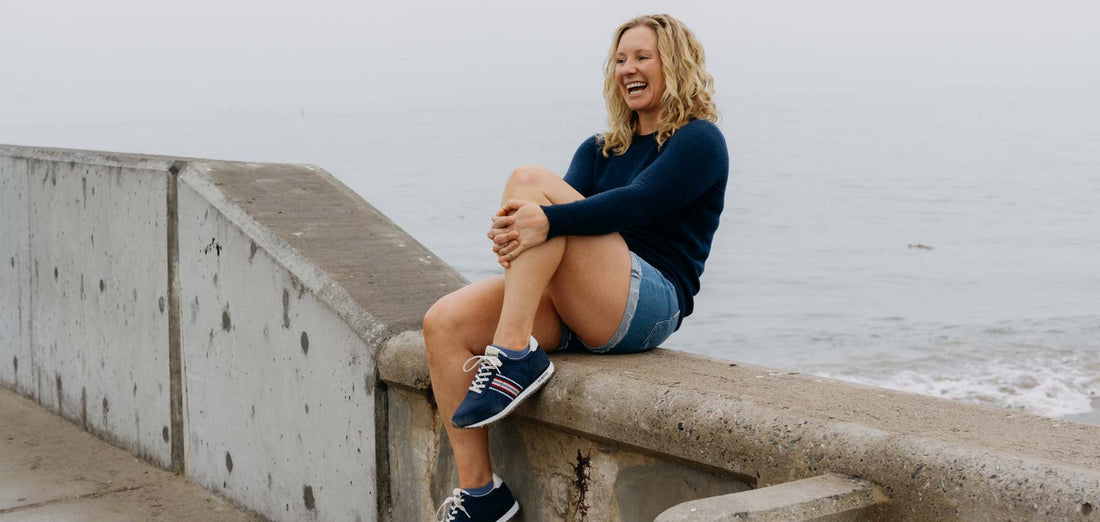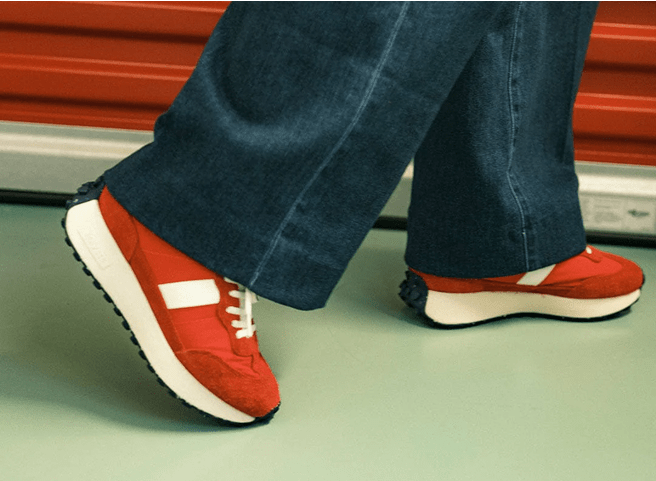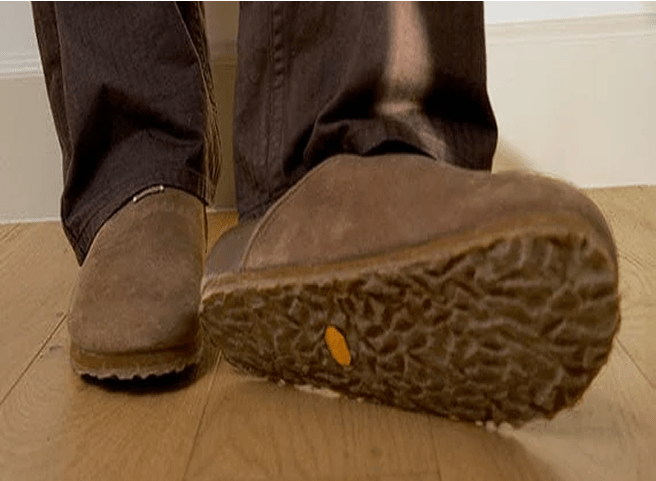Daydreamer Series: On Changing the Conversation with Yourself
Before she could start helping women challenge the way they saw themselves, Jenny Schatzle had to rewrite her own story.

When Jenny Schatzle finally worked up the nerve to teach her first fitness class at just 19 years old, it was so bad that some students actually walked out. “Oh God, I don’t blame them, I was awful,” she laughs, sipping from her paper coffee cup. “But that’s because I wasn’t being myself.”
Now 20 years a veteran of the fitness industry, it’s hard to imagine Jenny as anything but completely self-possessed. She’s a popular motivational speaker, a published author, co-owns Bond Fitness in Santa Barbara, and regularly posts raw and relatable messages to her thousands of Instagram followers encouraging them to break free from the patterns in their lives that are holding them back. But it wasn’t so long ago that Jenny was stuck in toxic cycles of disordered eating, negative body obsession and excessive drinking that prevented her from reaching her full potential. Before she could start helping women challenge the way they saw themselves, Jenny decided to rewrite her own story.
As told to SeaVees. Photography by Johnie Gall.


“I was working the front desk at Gold’s Gym when one of the group fitness instructors, Chanda, changed my life. She came up to me and said, ‘You’ve got rhythm, you’re loud, people seem to like you — you should try teaching.’ I immediately said no. Chanda was strong and powerful and confident in her body and commanded a room. She was everything I wanted to be but I didn’t think I had those things inside of me.
“She asked if I believed in myself, and I realized the answer was no. It completely changed the conversation in my head.”
When I finally decided to give it a try, I completely failed. Students were walking out and leaving nasty comments about me. I was trying to be just like Chanda, and they could feel that inauthenticity. I broke down in tears and wanted to just give up and quit. That’s when Chanda asked me if I believed in myself, and I realized the answer was no — it was a question that completely changed the conversation in my head. That’s when I started to authentically step into who I really was.

Seven years later, I was debating leaving Gold’s Gym and becoming an independent fitness trainer when I met my business partner. Stephen was about 47 at the time and had just started getting into fitness. So, he comes into the gym and sees everyone on their treadmills, watching the TV screens, staring into a mirror with headphones on, and everyone’s there for the same reason but no one is really together. But there’s this long line of people in the hallway, so Stephen asks the front desk about it and they tell him, ‘Oh, that’s Jenny’s cardio kickboxing class. People love it, you have to wait in line.’ He kept coming to my class until one day he approached me and asked if I wanted to take what I was doing to another level. I totally blew him off [laughs]. I was like, ‘What do you want, creeper?’ That’s until he came back six months later and handed me an article about the Oprah effect — how if Oprah talks about you you blow up with success — and said he could help get me to that point. I was like, ‘Well, what do I have to lose?’ I wrote him a check for everything in my bank account on the hood of my car. It was so scary, but he promised me I would meet a lot of people, have a lot of fun, and change a lot of lives.
I have patterns of being all or nothing, and that’s been true my entire life. I would binge eat junk food or just be eating salads. I’d work 12 hours a day or be on the couch. I’m a very extreme person, but there was a time when my drinking got out of hand. Stephen approached me and said, ‘I want to know your drinking isn’t going to affect our business, so I want you to not drink for six months and prove this isn’t a problem.’ I didn’t drink for the whole six months, but I also didn’t know how to live my life. I started restricting my food, over exercising and working nonstop instead — with me being that hyper-focused, the business just took off. Everyone was telling me how good I looked and how successful I was, but inside I was in emotional turmoil because I had no idea who I was anymore. On the six-month mark, the first thing I did was have a drink. I think that’s when I think my alcoholism really kicked in.


Things got really dark for about three years. I felt like a total hypocrite because here I was telling people to get healthy, and behind closed doors I’m black-out drunk. It got to the point where I was drinking at eight in the morning. I’ve always been a good bullshitter. I was charismatic and good at lying, and if I disappointed you, I knew how to get you to forgive me. I could pull it together and show up to a workout class and perform. I had a way of getting back into people’s good graces.
“I turned to him and told him I was an alcoholic. He said, ‘Finally. Now we can move on.’”
There was a trainer I really liked doing a weekend business seminar and I had never been to something like that, so we decided I should go. He stood up in front of a room of fitness trainers and began talking about how we tend to be extremists and live two different lives. They’re telling people how to live, but then some of them are out doing drugs or drinking. Then he said something I’ll never forget. I took out a notebook and wrote it down: ‘In order to be a leader, you must be the example. 10/11/12, I’ll never drink again.’ I got home and went on a run with Stephen. It was dark and as we crested a hill, I turned to him and told him I was an alcoholic. He said, ‘Finally. Now we can move on.’

When I stopped drinking, I had to really feel some of my feelings for the first time and it was intense, so I started obsessing about my body and what I was eating instead. I’m a fitness trainer, and I would absolutely dread the moment I had to tell someone that because I knew they’d look me up and down and be judging my body and thinking, ‘How does this person own a gym?’ I lived a diet and binge cycle, never thinking my body was good enough to be a trainer, to have my name on a program. It’s easy to look at someone popping pills or drinking in the morning and pat ourselves on the back because, hey, at least we aren’t doing that. But if we’re on Amazon shopping all the time or scrolling on social media six hours a day or eating alone in a closet or whatever it is, it’s all to numb ourselves out. It’s keeping us from living our dreams.
“If we’re on Amazon shopping all the time or scrolling social media six hours a day, it’s to numb ourselves out. It’s keeping us from living our dreams.”
I’m ten years sober today — let me tell you, whatever shameful story you have in your past, I bet I have one to rival it. I never did AA because I got sober through therapy, but when I would take friends to those meetings, there was just something so powerful about all those people sitting in a room speaking their worst stories. We as women just live with so much guilt and shame — around our bodies, money, relationships — and tell ourselves stories of not doing enough or being enough. But all that does is keep us right where we are. When we live in cycles of shame and guilt, they keep us small. I realized that’s what I want to create: a space for women to speak and confront their guilt and shame.


I want to reach one million women. What can I say, I like to shoot big. My new dream for the Jenny Schatzle program has three parts: a retreat here in Santa Barbara, more public speaking, and an online program where I’m creating a community of women who come together to feel seen, loved and help each other move forward from shame. I really believe women want this and it’s the right time for this. I believe the conversation is changing.
“That’s part of the advice I give everyone who isn’t sure about their dream yet: figure out what you don’t want to do and let that guide you.”
So many of us are trying so hard to make the outside look good that we forget to make the inside feel good. I think that’s a question we need to ask ourselves a lot when we’re showing up in the world: do I want to look good or feel good? That’s part of the advice I give everyone who isn’t sure about their dream yet: figure out what you don’t want to do and let that guide you. I mean, every single decision I’ve made is to avoid working in an office [laughs]. I worked three jobs while opening the gym. I waited tables at a restaurant to make it work because I knew it would kill my soul not to chase that dream.
We all feel imposter syndrome. Who’s going to listen to me? I’m not smart enough. I don’t have the credentials. So many of us look at other people and assume they have it all together, but what if we turned that lens on ourselves? I’ve had a lot of changes in my confidence since I was 19 years old and admiring that other trainer at Gold’s Gym, and at 42 I realize that so often what we admire in other people is a reflection of ourselves. You have to step back and say, ‘I love those qualities in that person because I possess those qualities myself.’ Then you go out and start building a life around them.
Jenny wears the Royal Runner from the Heritage Sport Collection.


